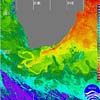| . |  |
. |
Much has been made of the economic impacts of recent biological invasions, but what are the implications of invasions in deep time? Luiz Rocha leads geneticists who time travel through ocean environments. The results of their travels, published online in Molecular Ecology, tell us that during warm, interglacial periods, reef-associated fish (goby genus Gnatholepis), leapt around the horn of Africa into the Atlantic, where their range expanded as the world warmed. "We found that global warming events correspond clearly with major range expansions of gobies from the Indian Ocean into the Atlantic Ocean and subsequently into the Eastern Atlantic," summarizes Rocha. A chilly Antarctic current - the Benguela upwelling system - surges up along the western coast of Africa acting as a natural barrier, and has prevented most warm water organisms from the Indian Ocean from making it in to the Atlantic for the last 2 million years. But when the world warmed about 150,000 years ago, gobies slipped around the corner of the continent. Researchers at the Smithsonian Tropical Research Institute, Scripps Institution of Oceanography, Hofstra University and the University of Hawaii, sequenced goby DNA (774 pb of the mtDNA of cytochrome b, to be exact) from the western, central and eastern Atlantic Ocean. They also sequenced DNA from gobies in the same genus from South Africa, from the Cocos Keeling Islands in the eastern Indian Ocean, and from the Cook Islands in the South Pacific. They calculate the approximate amount of time that isolated groups of fish have been separate based on the differences in the DNA between groups. What evidence do they have that makes them think that Atlantic gobies are invaders? "The Atlantic goldspot goby certainly is a prime candidate-it's the only species of the genus in the Atlantic and there are eight species and subspecies in the Indo-Pacific. It's really similar to a sister taxon in the Indian Ocean," Rocha continues. "We nailed down the timeline of the invasion by sequencing--the last time there was tropical ocean connecting these two areas was 2 million years ago. We calculate that these fish invaded the Atlantic Ocean during a warm period about 150,000 years ago and arrived in the eastern Atlantic only 30,000 years ago." What future effects of climate change might we expect in the marine realm? "Genetic analysis told us that fish from the Indian Ocean breached the Benguela barrier in the past, and this barrier seems to open intermittently. It would be reasonable to expect that other organisms limited by cold water barriers will continue to expand their ranges during warm periods."
Ref. Rocha, L.A., Robertson, D.R., Rocha, C., Van Tassell, J.L., Craig, M.T., Bowen, B.W. 2005. Recent invasion of the tropical Atlantic by an Indo-Pacific coral reef fish. Molecular Ecology online. Related Links Smithsonian Tropical Research Institute TerraDaily Search TerraDaily Subscribe To TerraDaily Express  Cape Town, South Africa (SPX) Oct 11, 2005
Cape Town, South Africa (SPX) Oct 11, 2005Water from the Indian Ocean does not reach the South Atlantic Ocean continuously, but in separate packages. These are called Agulhas eddies, after the current along the east coast of Southern Africa where they originate from.
|
| ||||||||||
| The content herein, unless otherwise known to be public domain, are Copyright 1995-2016 - Space Media Network. All websites are published in Australia and are solely subject to Australian law and governed by Fair Use principals for news reporting and research purposes. AFP, UPI and IANS news wire stories are copyright Agence France-Presse, United Press International and Indo-Asia News Service. ESA news reports are copyright European Space Agency. All NASA sourced material is public domain. Additional copyrights may apply in whole or part to other bona fide parties. Advertising does not imply endorsement, agreement or approval of any opinions, statements or information provided by Space Media Network on any Web page published or hosted by Space Media Network. Privacy Statement All images and articles appearing on Space Media Network have been edited or digitally altered in some way. Any requests to remove copyright material will be acted upon in a timely and appropriate manner. Any attempt to extort money from Space Media Network will be ignored and reported to Australian Law Enforcement Agencies as a potential case of financial fraud involving the use of a telephonic carriage device or postal service. |